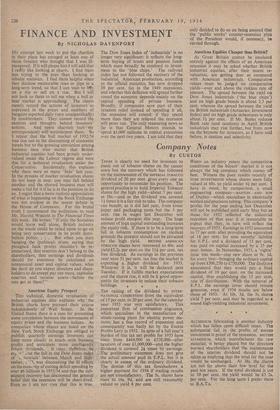Company Notes
By CUSTOS THERE is clearly no need for investors to panic out of tobacco shares on the cancer scare but the recovery which has followed on the maintenance of the IMPERIAL TOBACCO dividend of 20 per cent. gives every one an opportunity to reconsider his position. The general practice is to hold Imperial Tobacco shares for the high yield—about 7 per cent. at 56s.—and as the dividend was covered times it is a fair risk to take. The company can benefit, as it did last year, from lower paper and packaging costs but the 3 per cent. rise in wages last December will reduce profit margins this year. The huge amount of loan capital outstanding increases the equity risk. If there is to be a long-term fall in tobacco consumption on medical grounds the investor should not be attracted by the high yield. BRITISH AMERICAN TOBACCO shares have recovered to 40s. and yield £5.2s. per cent on the 111 per cent. tax free dividend. As earnings in the previous year were 51 per cent. tax free the market is expecting a higher dividend for 1953. Whatever it is, it will be declared next Tuesday. If it fulfills market expectations and the shares rise, it will be h good oppor- tunity for investors to reduce their tobacco holdings. • THE raising of the dis*ridend by INTER- NATIONAL COMBUSTION from the equivalent of 15 per cent. to 20 per cent: for the calendar year 1953 was very satisfactory. This important firm of combustion engineers, which specialises in the manufacture of steam-raising plant for electric power sta- tions, has a fine record of expansion and consequently was badly hit by the Excess Profits Levy in 1952. In spite of a full year's burden of this tax net profits for 1953 have risen from £464,000 to £528,000—after taxation of over £1,000,000—and the higher dividend is covered 21 times by earnings. The preliminary statement does not give the actual amount paid in E.P.L. but it is clearly in excess of the ordinary dividend. The demise of this tax foreshadows a higher payment for 1954 if trading results are not unsatisfactory. The 5s. shares have risen to 16s. 9d. and are still reasonably valued to yield 6 per cent. WHEN an industry enters the competitive conditions of the bilyer$' market it is not always the big company which comes off best. Witness the poor results recently of TUBE INVESTMENTS whOSe shares seem fully valued at 68s. to yield under 41 per cent. I. have in mind, by comparison, a small engineering company—mato/4 AND SON of Dudley—which specialises in electrically welded and precision tubing. This company's profits for the year ending last December will not be published until early May but as those for 1952 reflected the industrial recession of that year it is reasonable to expect that they, in turn will reflect the recovery of 1953. Earnings in 1952 amounted to 77 per cent. after providing the equivalent of 18 per cent. for nine months' liability for E.P.L. and a dividend of 15 per cent. was paid on capital increased by a 25 per cent. bonus. In Notiember, 1953, a 'rights' issue was made—one new share at 9s. 3d. for every two—bringing the ordinary capital up from £506,250 to £750,000. The directors announced that they would pay a final dividend of 10 per cent. on the increased capital, thus establishing the 15 per cent. rate of distribution. With the removal of E.P.L. the earnings cover should remain generous, even if 1954 fesults are below those of 1953. At 10s. 3d. the 5s. shares yield 7• per cent. and may be regarded as a sound high-yielding industrial investment.
•
ALUMINIUM fabricating is another industry which has fallen upon difficult times. The substantial fall in the profits of BIRMID INDUSTRIES is proof of the recession. BRITISH ALUMINIUM, which manufactures the raw material, is better placed but the directors warned shareholders that the maintenance of the interim dividend should not be taken as implying that the total for the year would be unchanged. At 38s. the shares are not far above their low level for the past ten years. If the total dividend is cut to 10 per cent. the yield would be £5 2s. per cent. For the long term I prefer them to B.A.T.s.


































 Previous page
Previous page